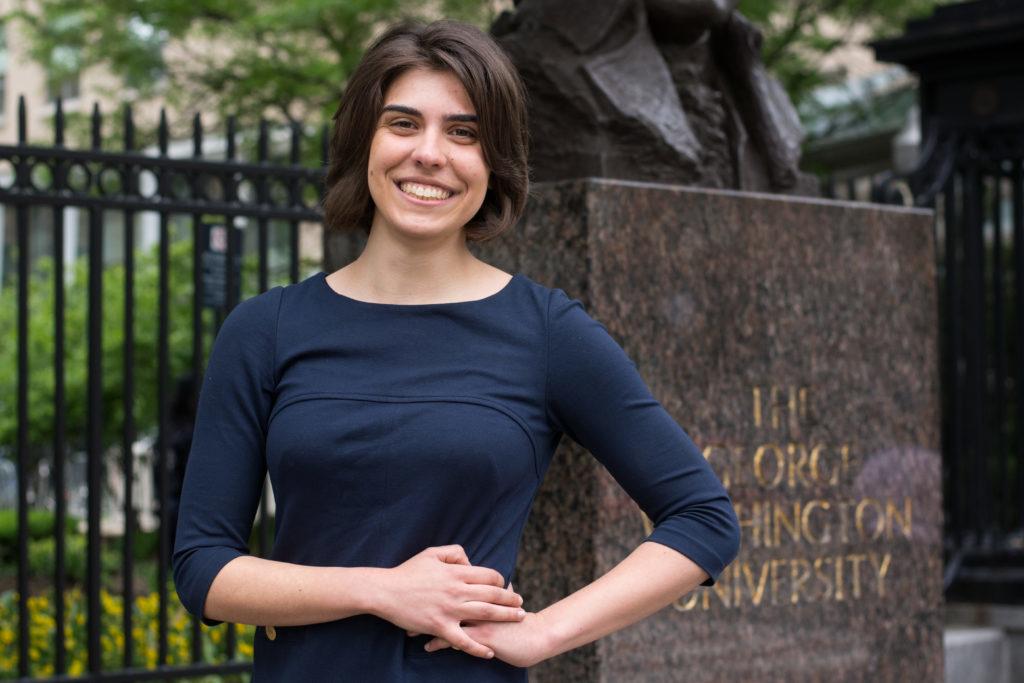Updated: May 15, 2017 at 1:00 p.m.
When Celeste Aguzino began her senior year this fall, she had a full semester of federal government experience under her belt and plans to go onto a career in the federal workforce.
Then, Donald Trump was elected president.
As seniors prepare to graduate on the National Mall Sunday and enter the workforce, some students interested in politics who initially planned to kickstart their career in a Democratic Hillary Clinton presidential administration are now moving away from work in the federal government – and moving from the District altogether.
Aguzino is among them. She spent the spring semester of her junior year as a full-time intern in the White House press office, where she worked in media relations dealing with national and regional news outlets. The political communication major had planned to pursue a similar position after graduation.
But when Trump upset former presidential candidate Clinton to win the presidential election last November, Aguzino decided to switch up her plans, opting now to get involved in local government in her home state of Illinois.
“I don’t know even if my voice would be in the room,” she said about working in the executive branch under Trump. “I don’t know how significant it would be or if it would be listened to, even as someone in an entry-level government job.”
In the days following the election, many students across campus were in shock – gathering for a “group cry” and protests. Both students and faculty were concerned about the political shakeup Trump would bring to D.C. and questioned their career paths.
GW graduates have a long history of entering the federal workforce, and the University is often viewed as a pipeline to policy and government jobs in the District. In the last three graduating classes, 1,288 students reported landing jobs in D.C. out of about 6,000 total respondents, according to GW’s post-graduation employment survey.
Sixty-four percent of the Class of 2016 said they were employed within six months of graduation – a 7 percent increase from last year.
Sixty-four percent of the Class of 2016 said they were employed within six months of graduation – a 7 percent increase from last year – and 10 percent of those respondents work in public-sector and government jobs. Eleven percent of graduates from the last three classes reported employment in government-related fields.
For Jen Sherman, a senior and political science major, the election was an early career turning point.
Sherman said she has a job lined up after graduation at the American Bar Association – a shift away from her previous experiences in federal government work. She interned two years ago at the Department of Education, and last semester she worked at the Legal Services Corporation, a nonprofit organization established by Congress to provide civil legal aid to low-income Americans.
“Basically, I saw that Trump’s priorities were not really in the kinds of departments – even if I wasn’t really working on major political issues – that I was interested in, which means that I thought there would be very few hiring opportunities in those departments,” she said.
Sherman said Trump’s budget proposal in March, which proposed eliminating funding to the Legal Services Corporation, was the final straw to move her career plans past the federal government. The budget proposal slashed funding for a number of federal agencies not involved in national security.
“I want to be somewhere where the president couldn’t just say ‘oh, your work doesn’t exist anymore,’” she said.
Rachel Brown, the assistant provost for Career Services, said it is too early to tell whether fewer members of the Class of 2017 are heading to work in the federal government. The University sends alumni a postgraduate employment survey and collects information in the first six months after graduation.
Brown said students who have been turned off from federal government work have a number of other options to use their talents.
“Government has been increasingly dysfunctional, and it’s had that image for the last 10 years, maybe this century.”
“Public service can be achieved in many ways, from working for the federal government to working or volunteering on a campaign, conducting research for an NGO, lobbying or advocating on behalf of a non-profit or even running for office,” she said.
Steve Fuller, the senior adviser and director of special projects with the Center for Regional Analysis at George Mason University and a former GW faculty member, said students might be straying away from government work not only as a result of Trump, but also a general frustration with the federal government.
“Government has been increasingly dysfunctional, and it’s had that image for the last 10 years, maybe this century,” he said. “For quite a long time, federal government has seemed to be unable to get things done.”
Fuller said in the Trump era, students who previously saw the government as a “change agent” under the Obama administration may have been turned off by some of Trump’s agenda, like moving funding from domestic programs to defense agencies and ending progressive policies.
“All of that sends a message that maybe federal government isn’t the place for people that would hope to be involved in something new and exciting,” he said.
This post was updated to reflect the following correction:
The Hatchet incorrectly reported that graduates are sent an employment survey six months after graduation. They send the survey and collect information up to six months after graduation. We regret this error.





